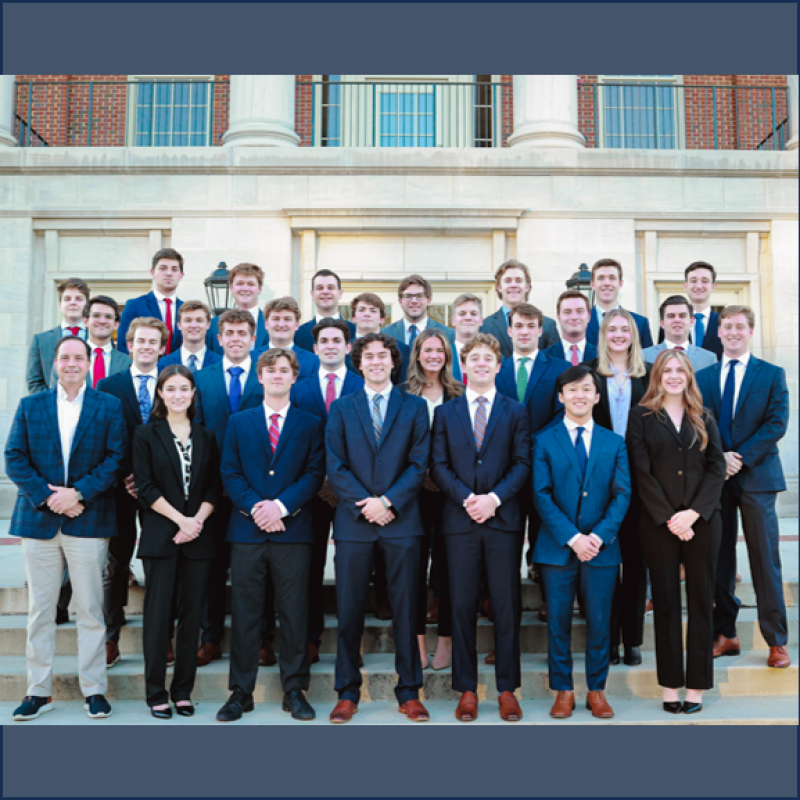Like most real estate investors, Harris Snipes meets with other real estate professionals as part of his job, discussing potential deals and searching for good investment opportunities. Unlike most real estate investors, though, Snipes is still an undergraduate student.
Fortunately, the Culverhouse senior has the full weight of the UA Student Real Estate Investment Fund (SREIF) and the student support provided by the Alabama Center for Real Estate (ACRE)‘s College Career Assistance Program (CCAP) behind him. As president of the fund, Snipes is seeking to move SREIF out of investing in publicly-traded Real Estate Investment Trusts (REITs), and into real estate private equity as a limited partner. In the meetings, though, he doesn’t pitch the investment side of it as much as the potential educational opportunities. “A lot of people really love the idea of being able to help out students who are willing to devote an outsized portion of their time to learning the business,” he said.
Within the fund, students serve as officers and analysts, and are responsible for daily operations. The student-managed team reports to a faculty advisor and a board of advisors comprised of industry professionals, faculty, and the ACRE director. In turn, the students gain real-world, practical experience evaluating and underwriting real estate investments.
Snipes is the second president of the fund, which was launched during the COVID-19 pandemic. Culverhouse alum Kyle Bishop had the idea for the fund while studying real estate after noticing that several competitor universities had similar funds. Bishop took the idea to ACRE Director Grayson Glaze and Associate Professor of Finance Dr. Alan Tidwell, and pitched a “flywheel concept” for the fund. Bishop explained, “I told them that if we can create this fund, it will lead to better education outcomes for students, subsequently resulting in better job opportunities. This, in turn, will enhance public perception of our university, which will attract the highest quality students to The University of Alabama to study real estate. I believed all of this would improve UA and the real estate industry in Alabama.” Together, Bishop, Glaze, and Tidwell, with the help of the Culverhouse development team, raised an initial $500,000 from generous donor supporters to launch the fund.
“The Center provides resources that support the real estate industry and promote economic and workforce development. The Fund is a significant tool for career enhancement and we plan to continue integrating this new student-led initiative into the broader Capstone real estate experience,” Grayson Glaze said.
After the fund launched, and Bishop graduated, Culverhouse alum Emmett Wilson took the helm as president. “Any time you’re trying to get something off the ground versus just operating a fully functioning, built-out organization, it’s a lot of work,” Wilson said. Much of his initial work involved recruiting: He needed driven students to help develop the organization. But personnel was just one piece of the puzzle. “We had to decide what we were going to spend the money on, how we were going to spend our time together as an organization, how big we wanted to be, what kinds of people we wanted to recruit, and what sort of board members we wanted to invite,” he said. The group benefits from the involvement of alumni like Gardner Lee (MBA, 1993), for instance, a principal at GCP, a private equity group based out of Birmingham.
By the time Harris Snipes took over as president last spring, the fund was beginning to pick up speed. In addition to moving the fund into real estate private equity funds, Snipes always has one eye on education. “A lot of the time we’ve spent this semester has been solely learning and having speakers come in and walk us through deals that they’ve put together and raised capital for, from the time they bought it to the time that they sold it and made a profit.”
Currently, there are about 25 students involved in the fund. The competitive application process opens every semester. “And we try to bring in new students each semester. Ideally, we would like to have the fund members fairly evenly split between upper and lower division students,” Alan Tidwell explained.
“Right now it’s [about] building the foundation, but hopefully we’ll get to the point where there are a lot of strong senior upperclassmen leaders in the group that have the experience of being in the fund for a few years,” Harris Snipes said.
“And we’ll have more people that are able to shepherd the younger students that are in the fund as well.”

